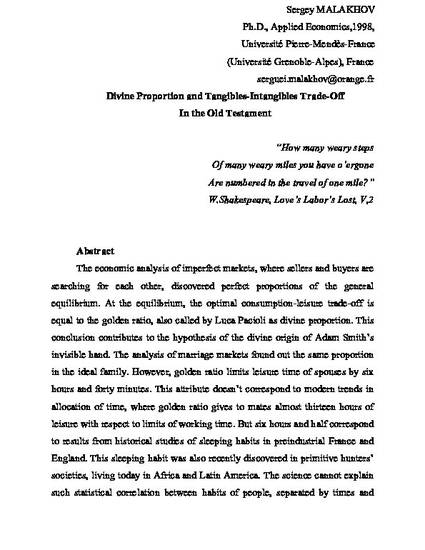
Unpublished Paper
Divine Proportion and Tangibles-Intangibles Trade-Off In the Old Testament
(2022)
Abstract
The economic analysis of imperfect markets, where sellers and buyers are searching for each other, discovered perfect proportions of the general equilibrium. At the equilibrium, the optimal consumption-leisure trade-off is equal to the golden ratio, also called by Luca Pacioli as divine proportion. This conclusion contributes to the hypothesis of the divine origin of Adam Smith’s invisible hand. The analysis of marriage markets found out the same proportion in the ideal family. However, golden ratio limits leisure time of spouses by six hours and forty minutes. This attribute doesn’t correspond to modern trends in allocation of time, where golden ratio gives to mates almost thirteen hours of leisure with respect to limits of working time. But six hours and half correspond to results from historical studies of sleeping habits in preindustrial France and England. This sleeping habit was also recently discovered in primitive hunters’ societies, living today in Africa and Latin America. The science cannot explain such statistical correlation between habits of people, separated by times and continents. The Old Testament gives such an explanation. Six hours and a half were given to men from the very beginning. After being banished from the Garden of Eden, Adam should get his food by the ‘sweat of his brow’; he had no leisure time in its modern sense, because during all his active time he was working. The general equilibrium also confirms its perfect proportions by the tangibles-intangibles trade-off faced by people. Being measured by their opportunity costs, intangibles are equal to tangibles given up. According to golden ratio, the share of tangibles given to church and charity, is equal to twenty per cent of agricultural income, which are equal to two tithes, prescribed to Hebrews by the Old Testament. Golden ratio also explains the five-times payback for the stolen ox, prescribed in Genesis. In addition, golden ratio follows the continuity of Testaments and exhibits the negative attractivity of pharisees with their demonstrative righteousness.
Keywords
- invisible hand,
- golden ratio,
- divine proportion,
- tangibles,
- intangibles,
- Old Testament
Disciplines
Publication Date
Spring March 25, 2022
Comments
This paper represents the application of economic theory to the economic theology
Citation Information
Sergey V. Malakhov. "Divine Proportion and Tangibles-Intangibles Trade-Off In the Old Testament" (2022) Available at: http://works.bepress.com/sergey_malakhov/34/
